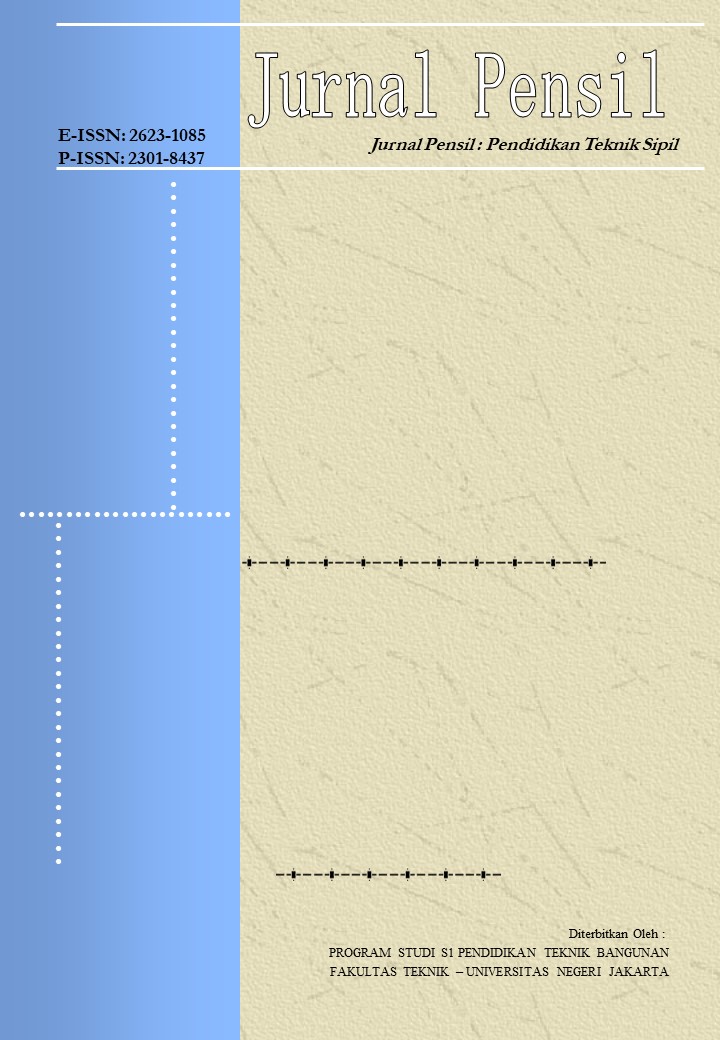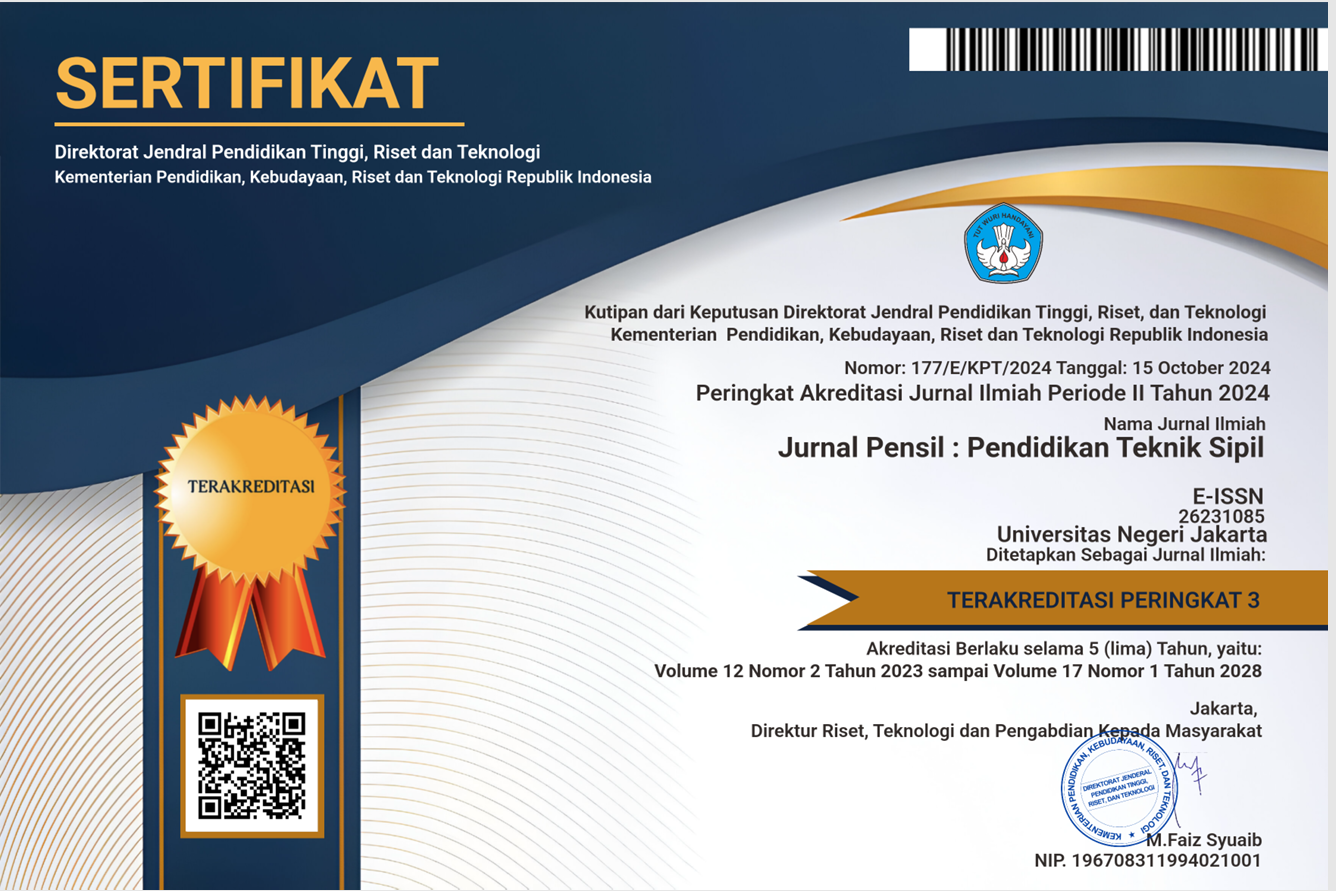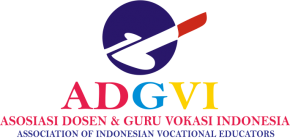LITERATURE REVIEW: THE ROLE OF E-MODULES IN IMPROVING VOCATIONAL STUDENTS’ SCIENTIFIC LITERACY SKILLS
DOI:
https://doi.org/10.21009/jpensil.v11i3.28673Keywords:
E-modules, 21st century skills, Scientific Literacy, Vocational EducationAbstract
Scientific literacy as a part of the 21st century skill set has a strategic position at the vocational level in preparing graduates who are competent, ready to work, and have skills in communicating and collaboration in work. This study will provide an overview of the role of e-modules which are the most widely developed as teaching materials in improving the student’ scientific literacy skills.. The research method used is a literature review by analyzing 5 most relevant national publication articles using the Google Scholar database. The results of the analysis of 5 articles show that e-modules not only answer the challenges of education in responding to technology, but also proven to play an active role in improving the scientific literacy skills of SMK students including critical and creative thinking skills in order to solve the problem. The e-modules contains aspects of scientific literacy and can be integrated with various learning approach according to the characteristic of vocational student, such as Problem Based Learning (PBL), Socio-Scientific Issues (SSI), Science Technology Engineering Mathematics (STEM) and Problem Based Learning (PBL) by the related occurency in daily life to help student build abilities which support scientific literacy skills.
References
Arini, Y. S. W. E., Gunawan, W., & Subandowo, M. (2021). Pengembangan Modul IPA Terapan Berbasis Problem Based Learning Untuk Mendukung Pembelajaran Mandiri Di SMK. Educate : Jurnal Teknologi Pendidikan, 6(2), 72. https://doi.org/https://doi.org/10.32832/Educate.V6i2.5060
Basito, M. D., Arthur, R., & Daryati, D. (2018). Hubungan Efikasi Diri Terhadap Kemampuan Berpikir Tingkat Tinggi Siswa SMK Program Keahlian Teknik Bangunan Pada Mata Pelajaran Mekanika Teknik. Jurnal Pendidikan Teknik Sipil, 7(1), 21–34. https://doi.org/https://doi.org/10.21009/Pensil.7.1.3
Cahyani, A. E. M., Mayasari, T., & Sasono, M. (2020). Efektivitas E-Modul Project Based Learning Berintegrasi STEM Terhadap Kreativitas Siswa SMK. Jurnal Ilmiah Pendidikan Fisika, 4(1), 15. https://doi.org/https://doi.org/10.20527/Jipf.V4i1.1774
Cahyanto, B., & Afifulloh, M. (2020). Electronic Module (E-Module) Berbasis Component Display Theory (CDT) Untuk Matakuliah Pembelajaran Terpadu. JINOTEP (Jurnal Inovasi Dan Teknologi Pembelajaran): Kajian Dan Riset Dalam Teknologi Pembelajaran, 7(1), 49–56. https://doi.org/https://doi.org/10.17977/Um031v7i12020p049
Crowell, A., & Schunn, C. (2016). Unpacking The Relationship Between Science Education And Applied Scientific Literacy. Research In Science Education, 45(2), 129–140. https://doi.org/https://doi.org/10.1007/S11165-015-9462-1
Drummond, C., & Fischhoff, B. (2017). Individuals With Greater Science Literacy And Education Have More Polarized Beliefs On Controversial Science Topics. Proceedings Of The National Academy Of Sciences Of The United States Of America, 9587–9592. https://doi.org/https://Doi.Org/10.1073/Pnas.1704882114
Dwi Atmaji, R., & Maryani, I. (2018). Pengembangan E-Modul Berbasis Literasi Sains Materi Organ Gerak Hewan Dan Manusia Kelas V SD. In Fundamental Pendidikan Dasar, 1(1).
Elvarita, A., Iriani, T., & Handoyo, S. S. (2020). Pengembangan Bahan Ajar Mekanika Tanah Berbasis E-Modul Pada Program Studi Pendidikan Teknik Bangunan, Universitas Negeri Jakarta. Jurnal PenSil, 9(1), 1–7.
Guo, P., Saab, N., Post, L. S., & Admiraal, W. (2020). A Review Of Project-Based Learning In Higher Education: Student Outcomes And Measures. International Journal Of Educational Research. https://doi.org/https://Doi.Org/10.1016/J.Ijer.2020.101586
Hasibuan, M. P., Sari, R. P., & Setiawaty, S. (2019). Penerapan Model Pembelajaran Dengan Pendekatan Saintifik Terhadap Pembentukan Habits of Mind Siswa. Jurnal IPA & Pembelajaran IPA, 3(2), 119–129. https://doi.org/https://Doi.Org/10.24815/Jipi.V3i2.14415
Haug, B. S., & Mork, S. M. (2021). Taking 21st Century Skills From Vision To Classroom: What Teachers Highlight As Supportive Professional Development In The Light Of New Demands From Educational Reforms. Teaching And Teacher Education. https://doi.org/https://Doi.Org/10.1016/J.Tate.2021.103286
Herawati, N. S., & Muhtadi, A. (2018). Pengembangan Modul Elektronik (E-Modul) Interaktif Pada Mata Pelajaran Kimia Kelas XI SMA. Jurnal Inovasi Teknologi Pendidikan, 5(2), 180–191. https://doi.org/https://Doi.Org/10.21831/Jitp.V5i2.15424
Islamiy, S. A., Sunaryanti, Y., Rahman, A. K., & Mulawarman. (2018). Fenomena Penggunaan Media Sosial: Tantangan Kehidupan Siswa di Era Disrupsi Ditinjau dari Aspek Sosial pada Masa Perkembangan Remaja. Proceeding Seminar Nasional Bimbingan Dan Konseling, 94–102.
Jatmoko, D. (2013). Relevansi Kurikulum SMK Kompetensi Keahlian Teknik Kendaraan Ringan Terhadap Kebutuhan Dunia Industri Di Kabupaten Sleman. Jurnal Pendidikan Vokasi, 3(1), 1–13. https://doi.org/https://Doi.Org/10.21831/Jpv.V3i1.1572
Kurniawati, T. D., Akhdinirwanto, R. W., & Fatmaryanti, S. D. (2021). Pengembangan E-Modul Menggunakan Aplikasi 3D Pageflip Professional Untuk Meningkatkan Kemampuan Literasi Sains Peserta Didik. Jurnal Inovasi Pendidikan Sains (JIPS), 2(1), 32–41. https://doi.org/https://Doi.Org/10.37729/Jips.V2i1.685
Larasati, M., Fibonacci, A., & Wibowo, T. (2018). Pengembangan Modul Berbasis Problem Based Learning Pada Materi Polimer Kelas XII SMK Ma’arif Nu 1 Sumpiuh. JTK (Jurnal Tadris Kimiya), 3(1), 32–41. https://doi.org/https://Doi.Org/10.15575/Jtk.V3i1.2038
Lavi, R., Tal, M., & Dori, Y. J. (2021). Perceptions Of STEM Alumni And Students On Developing 21st Century Skills Through Methods Of Teaching And Learning. Studies In Educational Evaluation, 70. https://doi.org/https://Doi.Org/10.1016/J.Stueduc.2021.101002
Magdalena, I., Sundari, T., Nurkamilah, S., & Ayu Amalia, D. (2020). Analisis Bahan Ajar. Jurnal Pendidikan Dan Ilmu Sosial, 2(2). https://doi.org/https://Ejournal.Stitpn.Ac.Id/Index.Php/Nusantara
Miller, D. M., & Czegan, D. A. C. (2016). Integrating The Liberal Arts And Chemistry: A Series Of General Chemistry Assignments To Develop Science Literacy. Journal Of Chemical Education, 93(5), 864–869. https://doi.org/https://Doi.Org/10.1021/Acs.Jchemed.5b00942
Mulyadi, E. (2016). Penerapan Model Project Based Learning Untuk Meningkatan Kinerja Dan Prestasi Belajar Fisika Siswa SMK. Jurnal Pendidikan Teknologi Dan Kejuruan, 22(4), 385. https://doi.org/https://Doi.Org/10.21831/Jptk.V22i4.7836
Muzijah, R., Wati, M., & Mahtari, S. (2020). Pengembangan E-Modul Menggunakan Aplikasi Exe-Learning Untuk Melatih Literasi Sains. Jurnal Ilmiah Pendidikan Fisika, 4(2), 89. https://doi.org/https://Doi.Org/10.20527/Jipf.V4i2.2056
Nurjannati, N., Rahmad, M., & Irianti, M. (2016). Pengembangan E-Modul Berbasis Literasi Sains Pada Materi Radiasi Elektromagnetik. Jurnal Pendidikan Fisika, 2(1), 1–11.
Pantiwati, Y., & Husamah. (2015). Analisis Kemampuan Literasi Sains Siswa SMP Kota Malang. In I. W. Surata & I. K. Suarnaya (Eds.), Konferensi Tahunan Himpunan Evaluasi Pendidikan Indonesia (HEPI), 158–174.
Rahayu, P. P., Masykuri, M., & Suparmi. (2020). Pengembangan Modul Fisika Project Based Learning (Pjbl) Menggunakan Analogi Untuk Meningkatkan Keterampilan Literasi Ilmiah Materi Temperatur Dan Kalor Siswa Kelas X SMK. Universitas Sebelas Maret.
Rahmatullah, M. F., Pasani, C. F., & Yulinda, R. (2021). Pengembangan Bahan Ajar Berbasis Literasi Sains Bermuatan Karakter Toleransi Untuk Siswa SMP Pada Materi Pewarisan Sifat. Jurnal Pahlawan, 17(02), 1–10.
Rusilowati, A., Nugroho, S. E., & Susilowati, S. M. (2016). Development Of Science Textbook Based On Scientific Literacy For Secondary School. Jurnal Pendidikan Fisika Indonesia, 12(2), 98–105. https://doi.org/https://Doi.Org/10.15294/Jpfi.V12i2.4252
Subiantoro, A. W. (2011). Socio-Scientific Issues And Its Potency On Biology Instruction For Character Edu- Cation In Indonesia. Proceeding Of The 4th Inter- National Conference On Science And Mathematics Education, 136–144.
Sulistiani, Kartimi, & Cahyati Sahrir, D. (2022). E-Modules With Android Appy Pie Based On Socio-Scientific Issues To Improve Students’ Critical Thinking Skills. Journal Of Education Technology, 6(2), 372–379. https://doi.org/https://Doi.Org/10.23887/Jet.V
Syahputri, Z., Rahmad, M., & Veranita, D. (2019). Empirical Analysis Of E-Module Based On Science Literation As A Source In Learning Electromagnetic Radiation Material. Jurnal Geliga Sains (JGS): Jurnal Pendidikan Fisika, 7(2), 128–137. https://doi.org/Https://Jgs.Ejournal.Unri.Ac.Id/Index.Php/JGS
Taar, J., & Palojoki, P. (2022). Applying Interthinking For Learning 21st-Century Skills In Home Economics Education. Learning, Culture and Social Interaction, 33. https://doi.org/Https://Doi.Org/10.1016/J.Lcsi.2022.100615
Teo, T., Unwin, S., Scherer, R., & Gardiner, V. (n.d.). Initial Teacher Training For Twenty-First Century Skills In The Fourth Industrial Revolution (IR 4.0): A Scoping Review. Computers And Education, 170. https://doi.org/Https://Doi.Org/10.1016/J.Compedu.2021.104223
Tsai, C. Y. (2018). The Effect Of Online Argumentation Of Socio-Scientific Issues On Students’ Scientific Competencies And Sustainability Attitudes. Computers And Education, 14–27. https://doi.org/Https://Doi.Org/10.1016/J.Compedu.2017.08.009
Valladares, L. (2021). Scientific Literacy And Social Transformation: Critical Perspectives About Science Participation And Emancipation. Science And Education, 30(3), 557–587. https://doi.org/Https://Doi.Org/10.1007/S11191-021-00205-2
Valtonen, T., Hoang, N., Sointu, E., Näykki, P., Virtanen, A., Pöysä-Tarhonen, J., Häkkinen, P., Järvelä, S., Mäkitalo, K., & Kukkonen, J. (2021). How Pre-Service Teachers Perceive Their 21st-Century Skills And Dispositions: A Longitudinal Perspective. Computers In Human Behavior, 116. https://doi.org/Https://Doi.Org/10.1016/J.Chb.2020.106643
Wang, Y., & Chen, Y. (2019). Review And Prospect Of The Research On Vocational Core Literacy Of Secondary Vocational School Students. Vocational Education, 08(03), 115–122. https://doi.org/Https://Doi.Org/10.12677/Ve.2019.83020
Wannapiroon, P., Nilsook, P., Techakosit, S., & Kamkhuntod, S. (2021). STEM Literacy Of Students In Vocational Education. International Journal Of Technology In Education And Science, 5(4), 527–549. https://doi.org/Https://Doi.Org/10.46328/Ijtes.253
Warwas, J., & Helm, C. (2018). Professional Learning Communities Among Vocational School Teachers: Profiles And Relations With Instructional Quality. Teaching And Teacher Education, 42–55. https://doi.org/Https://Doi.Org/10.1016/J.Tate.2018.03.012
Wright, K. L., Franks, A. D., Kuo, L. J., Mctigue, E. M., & Serrano, J. (2016). Both Theory And Practice: Science Literacy Instruction And Theories Of Reading. International Journal Of Science And Mathematics Education, 14(7), 1275–1292. https://doi.org/Https://Doi.Org/10.1007/S10763-015-9661-2
Yuliati, Y. (2017). Literasi Sains Dalam Pembelajaran IPA. Jurnal Cakrawala Pendas, 3(2), 21–28.











.png)
.png)
1.png)

